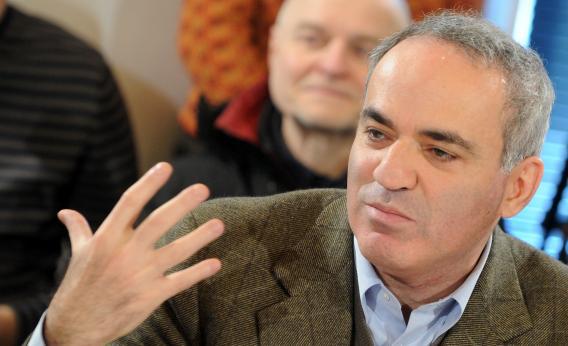Still best known for his legendary chess career—he was the No. 1-ranked player in the world for nearly two decades—and his defeat by IBM computer Deep Blue in 1997, Garry Kasparov found his toughest opponent only after retiring in 2005: He has become one of the highest-profile critics of Russian President Vladimir Putin.
Kasparov, who ran unsuccessfully for president in 2008, left Russia indefinitely this summer fearing persecution for this opposition activities. He had recently been arrested at a rally on behalf of imprisoned punk group Pussy Riot.
With President Obama heading to Moscow for what’s sure to be a tense G-20 Summit in St. Petersburg this week, Kasparov—now chairman of the board of the New York-based Human Rights Foundation—spoke with Slate about why he thinks Obama should stay home and how the world can send a message at the Sochi Olympics.
Joshua Keating: President Obama is traveling to Moscow this week at a time of very high U.S.-Russian tension. How would you advise that he deal with President Putin right now?
Garry Kasparov: I think that Obama going to Russia now is dead wrong, morally and politically. I wasn’t dead-set against him going there after the Edward Snowden situation, but right now he has a brilliant excuse. I’m shocked that he hasn’t used it. He has to sell the Syrian strike to the American people. He cannot do that from Russia. This is the regime that is behind Assad, that is the only guarantee of survival for the Assad regime, that provided him with these weapons. Going there shows a lack of political management and leadership.
JK: How do you think Putin’s strong support for Bashar al-Assad’s government is playing with the Russian public?
GK: I don’t think that in Russia people care very much about it. The public that watches anti-American propaganda might see it as another act of American aggression. The intellectuals, and those who access the Internet, I don’t think they care very much. There may be rejection of Assad, but the other side doesn’t look very democratic either.
JK: With rising calls for an Olympic boycott, you’ve been advocating what you call a “boycott Putin” campaign. What do you mean by that?
GK: As a former professional athlete, I think that forcing athletes to play a political role against their will is not fair and what happens very often is that politicians who are not ready to make a decision hide behind athletes. I think in Sochi, there’s a very simple solution to send a message to Sochi’s regime. It should start with leading politicians not attending the games. Then of course, we have to put pressure on the sponsors and the media. Coca-Cola, McDonald’s, NBC: They have to play a role in sending the message of the majority of their customers to Russia.
A lot of people in the West are appalled by what’s happening in Russia. It would be very easy for Coca-Cola, for instance, to demonstrate this by, let’s say, putting a rainbow flag on each Coca-Cola can. Or for NBC to do interviews with Russian gay activists or with Russian political activists: the people from Sochi who’ve been thrown out of their houses or the ecologists who’ve been thrown in jail for protesting against Putin’s barbarian activities in UNESCO-protected areas.
It doesn’t mean a boycott of the games, it’s just a way to present the true colors of Putin’s Russia.
JK: What do you think of the campaign by gay activists in the U.S. to boycott Russian brands like Stolichnaya?
GK: It could be helpful. I don’t think that it will hurt Putin because these actions are not seen in Russia. I don’t know who owns these famous brands, but I don’t believe this boycott can be economically meaningful. Even if they do it, I’m not sure that the owners of these products can really influence Putin. It’s good, but I don’t think it’s as good as influencing those companies that will be in Sochi. The message must be sent there, not in the U.S.
JK: Do you think this hostility to LGBT people from the Russian regime is genuine, or is it cover for something else?
GK:I don’t think Putin has even thought very much about it before. But it’s a natural slide, the degradation of the Putin state that has always been looking for enemies. It’s the natural fate of any dictatorship to need enemies: Jews, Gypsies, gays, whoever. Living without enemies for this regime is impossible. It’s the same for Hitler, Mao, Mugabe, Lukashenko. It’s like drug users. Once you create an atmosphere of hatred, you need to increase the dose.
JK: Do you have any plans to re-enter Russian politics?
GK: I’m not isolating myself. I’m writing a lot of articles and keeping an eye on the situation. I’m supporting [blogger and opposition leader] Alexei Navalny. But I have interests that might be badly damaged if I remained in Russia. I wish I could go freely back and forth. I’m still a Russian citizen. I haven’t changed my status. But right now I have good reason to be concerned about my ability to leave Russia if I returned to Moscow.
